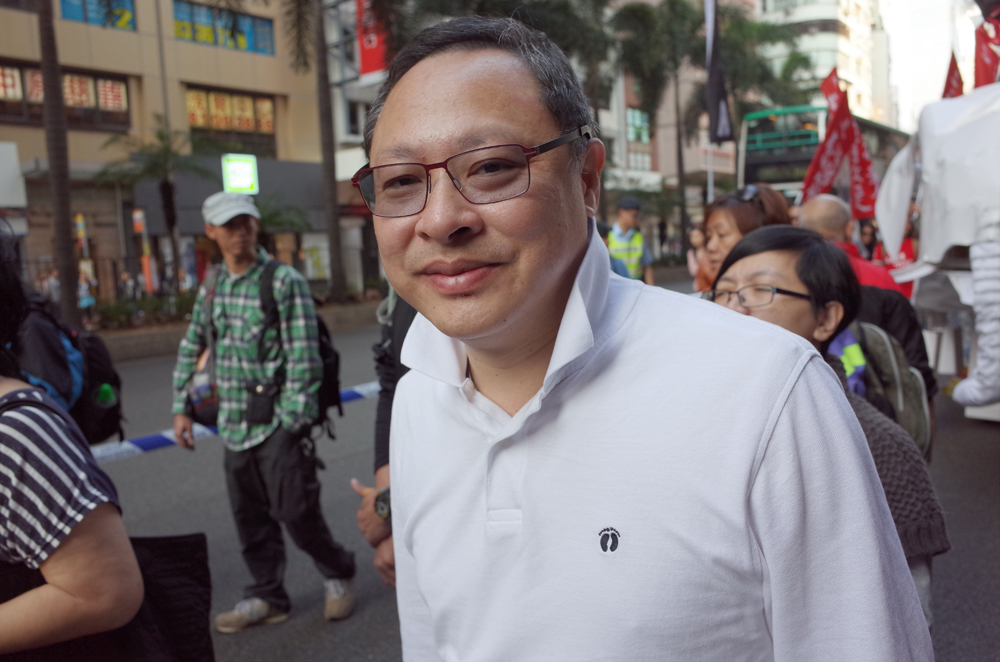Thousands of protesters marched on New Year’s Day against government spending on “white elephant” infrastructure projects. Demonstrators also called for a universal pension scheme.
The annual protest, which was postponed to February last year, returned on January 1 for people to “release their anger towards the government on the holiday”, according to James Hon Lin-shan, a spokesperson for the march. This year’s rally was not organised by the usual host, the Civil Human Rights Front, but by some 40 civil organisations.

Hon said that around 4,000 people joined. He said he was satisfied with the turnout, since he only expected 1,000 to join.
The march began in Causeway Bay and ended at government headquarters in Admiralty around two hours later.
March almost to destination: Central Government Offices pic.twitter.com/99Fy1aYngI
— Kris Cheng (@krislc) January 1, 2016
Tong Hiu-yan, a university student, was marching with a giant “white elephant” symbolising the public funds spent on massive infrastructure projects.
“The money should be spent on the people, especially the universal pension scheme,” she told HKFP. “The government keeps saying the scheme will not be sustainable, but if it uses some of the HK$50 billion funds spent on infrastructure projects, it could continue for a long time.”

Mr Wong, a bus driver, put on a mask of Secretary for Labour and Welfare Matthew Cheung during the march, saying he is “not a good official”.
Wong said the universal pension scheme was under consultation “again and again”. “When will we have it?” he asked.

He said that there should be a pension scheme without means-testing and that everyone should be able to receive it. “Does the government want us to spend our money for our burial before getting a pension?” he said.
At new year’s day march, labour party asks for universal pension scheme with dressed protesters and paper carts pic.twitter.com/Czr0ydsM5O
— Kris Cheng (@krislc) January 1, 2016
Benny Tai Yiu-ting, co-founder of the pro-democracy Occupy Central movement in 2014, said that he joined the march because of the appointment of Arthur Li Kwok-cheung as chairman of the governing Council of the University of Hong Kong (HKU).
Tai, a staff member and alumnus of HKU, said that the decision made by Chief Executive Leung Chun-ying was made without listening to the public, and that people should keep on protesting.

“Though not many joined the march, the number does not matter,” Tai told HKFP. “We may not need another Occupy protest, but we need to protest in every aspect in our daily lives, to accumulate the pressure.”
He also said that he will join another march opposing Li’s appointment organised by the HKU Alumni Concern Group on Sunday.

The government issued a statement saying that “infrastructure investment helps boost Hong Kong’s economic development, creates job opportunities, improves people’s quality of life and enhances Hong Kong’s long-term competitiveness.”
“The Government is determined and committed to enhancing the well-being of elderly people,” the statement said. The government added that it encourages the public to make good use of the six-month consultation period to express their views on how to improve Hong Kong’s retirement protection system.

In response to criticism of Arthur Li’s appointment, the statement said that “The HKSAR Government attaches great importance to upholding academic freedom and institutional autonomy.”
“As for the appointment of chairpersons and members to the councils of universities, the Government’s decisions are based on the merits of individuals, including their ability, expertise, experience, integrity and commitment to public service.”
